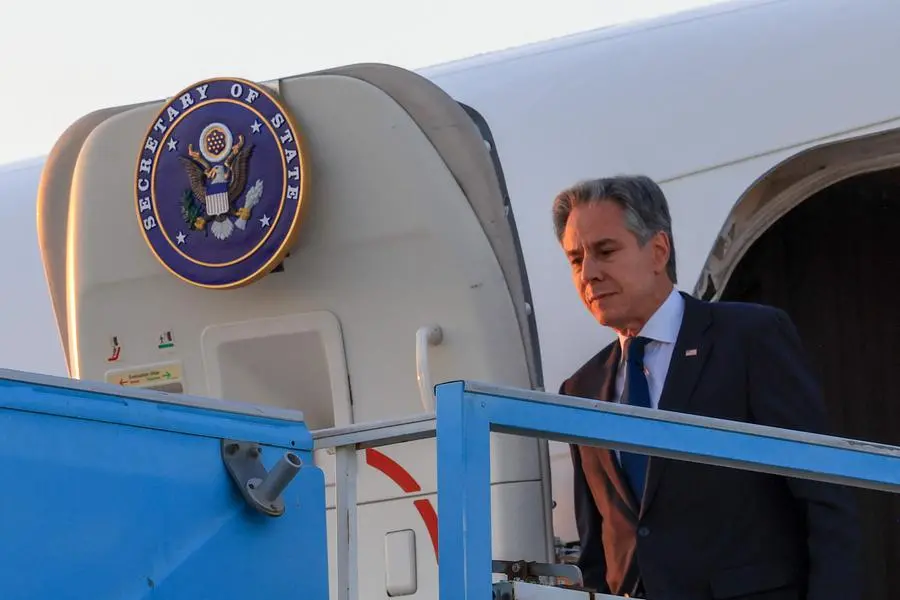PHOTO
Israel's under-pressure prime minister traded blame with Hamas militants on Sunday for delays in reaching a Gaza truce accord as top US diplomat Antony Blinken landed in Tel Aviv to push for a deal.
Making his ninth trip to the Middle East since the Gaza war began when Hamas attacked Israel in October, the US secretary of state is to meet Prime Minister Benjamin Netanyahu and other Israeli leaders.
Diplomats say a Gaza deal could help avert a wider conflagration, and a US official speaking on customary condition of anonymity said this is "a particularly critical time".
Blinken aims "to press any and all parties that it's important to get the remaining pieces of this across the finish line", said the official.
Ahead of truce talks in Qatar last Thursday and Friday, Hamas had called on mediators -- rather than holding more negotiations -- to implement a framework outlined in late May by US President Joe Biden.
Biden said Sunday that a ceasefire was "still possible" and that the United States was "not giving up" in brief comments to reporters.
After the Qatar talks between US, Egyptian and Qatari mediators, the United States submitted a new compromise proposal, leading Hamas on Sunday to accuse Netanyahu of obstruction.
According to Hamas, the proposal "responds to Netanyahu's conditions, especially his rejection of a permanent ceasefire and a comprehensive withdrawal from the Gaza Strip, and his insistence on continuing to occupy the Netzarim junction, the Rafah crossing and the Philadelphi corridor".
The latter two places are seen by Israel as important for preventing the flow of any weapons into the Gaza Strip, while the Netzarim junction sits at a strategic point between northern and southern Gaza.
Netanyahu was "fully responsible for thwarting the efforts of the mediators, obstructing an agreement, and (bears) full responsibility for the lives" of hostages in Gaza, the Islamist movement said in a statement.
Hamas officials have on several occasions accused Netanyahu of obstructing an agreement.
Western ally Jordan, hostage supporters protesting in Israel, and Hamas itself have called for pressure on Netanyahu in order for an agreement to be reached.
Far-right members crucial to the prime minister's governing coalition oppose any truce.
- Stakes have risen -
On Sunday Netanyahu reiterated that Hamas must be pressured.
"Hamas, up to this moment, remains obstinate. It did not even send a representative to the talks in Doha. Therefore, the pressure should be directed at Hamas and (Yahya) Sinwar, not at the Israeli government," Netanyahu said at a cabinet meeting, referring to the Hamas chief.
On Tuesday Blinken is to travel on to Cairo, where ceasefire talks will resume in the coming days.
The Biden framework, which he said was proposed by Israel, would freeze fighting for an initial six weeks as Israeli hostages are exchanged for Palestinian prisoners in Israeli jails and humanitarian aid enters the besieged Gaza Strip.
On Saturday, Netanyahu's office in a statement said Israeli negotiators have expressed "cautious optimism" about reaching a Gaza truce deal.
US, Qatari and Egyptian mediators also reported progress.
Months of on-off truce negotiations have taken place, so far without any agreement.
But the stakes have risen since the late July killings of Iran-backed militant leaders, including Hamas political chief Ismail Haniyeh, and as the humanitarian crisis in Gaza deepened with a feared polio outbreak.
Israeli evacuation orders have "reduced the safe zone" in the south of the territory, leaving "no more space" for displaced Palestinians, said Samah Dib, 32.
Some "are sleeping on the street", while clean water is scarce and food at the markets is "very expensive and we have no money left", said Dib, who like almost all Gazans is among the displaced.
As efforts towards a long-sought truce continued, so did the violence in Gaza, but also in the Israeli-occupied West Bank and in Lebanon, where Israeli forces and Hamas's Iran-backed ally Hezbollah have traded near-daily fire throughout the war. They did so again on Sunday.
- The rumble of tanks -
Civil defence rescuers in Hamas-run Gaza reported a total of 11 people killed in Israeli bombardment of Deir el-Balah and in air strikes on Jabalia refugee camp.
The latest killings helped push to 40,099 the death toll from Gaza's health ministry, which does not give details of civilian and militant deaths.
Hamas's October 7 attack on Israel that started the war resulted in the deaths of 1,198 people, mostly civilians, according to an AFP tally of Israeli official figures.
The Israeli military said troops continued operations in central and southern Gaza and "eliminated" militants in Rafah, on the territory's border with Egypt.
From the Israeli-designated safe zone in southern Gaza's Al-Mawasi, a fearful Lina Saleha, 44, said she could hear "constant artillery shelling" and the rumble of tanks "getting closer."
In the occupied West Bank, an attack in a Jewish settlement killed an Israeli man, a hospital said, three days after a deadly settler raid in a nearby Palestinian village.
In Lebanon, the UN said three peacekeepers were lightly injured in a blast in the country's south.
Iran and its regional allies have vowed retaliation for Haniyeh's death in Tehran -- which Israel has not claimed responsibility for -- and for an Israeli strike in Beirut that killed a top Hezbollah commander.
US officials have indirectly heard that Iran "want to see a ceasefire, they don't want to see regional escalation", the US official said.
Out of 251 hostages seized during Hamas's attack, 111 are still held in Gaza, including 39 the military says are dead. More than 100 were freed during a one-week truce in November.
The Palestinian Prisoners' Club watchdog group said that since the Gaza war began, Israeli forces have detained "more than 10,000 Palestinians" in the West Bank and annexed east Jerusalem, which Israel seized in 1967.





















